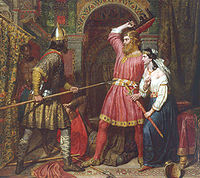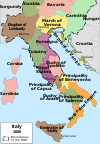Alboin
| Template:Wikify is deprecated. Please use a more specific cleanup template as listed in the documentation. |

Alboin or Alboïn (died 572 or 573) was king of the Lombards, and conqueror of Italy. He succeeded his father Audoin about 565. Cognates to these rather alien-looking names in Old English are Ælfwine (meaning 'Elf-friend') and Eadwine ('Wealth-friend'). The 7th-century Anglo-Saxon kings who bore these names were probably named after the Langobardic rulers, who had by their day asumed a near-mythical status.
History
The Lombards were at that time dwelling in Noricum and Pannonia (the plain of eastern Austria south and east of the Danube, modern-day Slovenia and Istria).
Early Wars
The Lombards had a Peace Treaty at the time Cunimund ascended the throne of the Gepids. At this time, the Lombards had established an alliance with the Avars, whom during the war occupied the lands of the Gepids. Despite these obstacle, Cunimund forced his people to fight, and announced that if his people were able to overcome the Lombards, they would then remove the Avars from their land. Under the leadership of Alboin, the Lombards were victorious. The Lombards had defeated the Gepids to complete destruction. Alboin killed Cunimund, and fashioned his skull into a goblet, known as a scala.
The success of Alboin had spread so far, that it reached Rome. Rome sought out the help of Alboin to defeat the Goths. The Lombards were transported to Rome by way of sea, and much to the hope of the Romans, defeated the Goths. Alboin had defeated Totila, the king of the Goths, to destruction. The Lombards returned to their homeland bearing riches and gifts for their people.
Invasion of Italy
Alboin, after all his military success, was convinced that he could set out for Italy and lead his people in a migration. The Saxons supplied Alboin and his army with 20,000 men to fight. Alboin then gave Pannonia to the Huns under the condition that if the Lombards were to return they would receive the land immediately. Alboin first entered Venetia, and declared that his nephew Gisulf would be the duke of the land conquered. Gisulf demanded that he would need the Lombard people of his choice, which Alboin agreed to.
Alboin first arrived at the river Piave. Alboin proceeded to capture the cities of Vicenza, Verona, and the remaining cities of Venetia. He had captured all the cities but Padua, Monselice, and Mantua. After conquering Venetia, Alboin moved his army to Liguria. He took all the cities of Liguria, except those situated on the shores. The city of Ticinum (Pavia), was the most difficult to take. The city lasted over three years before giving up after being besieged. In the end, Alboin had taken possession of everything as far as Tuscany, except Rome, Ravenna, and other fortified cities. Where the Lombards did meet with resistance, retribution was savage beyond anything Italy had experienced before. The bishops, who were virtually the leaders of the late antique Roman cities, fled, like the bishop of Milan, or compounded with the barbarians for gentler treatment of their people.
The courageous resistance of Ticinum provoked the fury of Alboin; he vowed to slaughter all of its inhabitants regardless of age or sex. But as he marched through the gates, his horse inexplicably fell and expired. Whether from compassion or piety, Alboin recanted his vow and spared the city of the massacre.
Controversy
In 572, according to Paul the Deacon (Paulus Diaconus), the 8th century Lombard chronicler, Alboin fell a victim to the revenge of his wife Rosamund, the daughter of the king of the Gepids, whose skull Alboin had turned into a drinking cup (worn at his belt) and out of which he forced Rosamund to drink. Rosamund went to Helemechis (or Helmgis), the king's squire (scilpor) or armour-bearer and foster brother, who advised her to seek out Peredeo, a very strong man. Peredeo refused to involve himself in such a crime. The chronicler turns to a familiar literary trope in relating that the queen went to the bed of the dressing-maid with whom Peredeo was having an affair and, unbeknownst to Peredeo, slept with him. When the deed was done, the queen revealed her identity to Peredeo.
Assassination
After Alboin ruled Italy for three and a half years, he was murdered by his wife. His wife, Rosemund, realized she should avenge the death of her father by murdering her husband. She formed a plan with the King’s squire, Helmechis, who suggested using Peredeo, a strong man. Peredeo refused to help, and that night had relations with Rosemund whom he mistook for his dressing maid, with whom he usually had intercourse. After learning of this evil he committed, he agreed to slay the king. The next day, Rosemund ordered a great silence in the palace and bound the sword to Alboin’s bed, because he was taking an afternoon nap. When Alboin awoke, he realized he would be murdered and reached for his sword, which he couldn’t grab because Rosemund had bound it tightly to the bed. After attempting to defend him with a footstool, he was slain and was buried under a certain set of stairs in his palace, and the Lombard people were full of grief.
So Peredeo and the queen fled to the protection of the Byzantines at Ravenna.

In these few years the Lombards had established themselves in the north of Italy (henceforth Lombardy). But they had little practice in governing large provinces. Lombard warlords (which Latin chroniclers called 'dukes') were established in all the strongholds and passes, and this arrangement became increasingly characteristic of the Lombard settlement. Their power extended tenuously across the Apennines into Liguria and Tuscany, and southwards to the outlying Lombard dukedoms of Spoleto and Benevento. The invaders failed to secure any maritime ports or any territory that was conveniently commanded from the sea, such as Ravenna. Local inhabitants fled into the marshes and lagoons, where Venice had its beginnings.
After his death and the short reign of his successor Cleph the Lombards remained for more than ten years without a king, ruled by the various dukes.
The primary sources for the history of Alboin include Paul the Deacon, the Byzantine Procopius, and Andreas Agnellus (in his history of the church of Ravenna).
Literary uses
In an early version of J. R. R. Tolkien's fantasy time-travel story The Lost Road, Tolkien considered placing one of his main characters in the person of Alboin.
In Meg Cabot's Princess Diaries, the country of Genovia's first ruler was a princess named Rosamund, based on the princess Alboin raped. In the book, Mia writes that Rosamund's father was killed by a warlord, who made his skull into a cup and forced her to drink from it. She strangled him in his sleep with her braids and was given the principality of Genovia in honor of her brave deed.
Sources
- Charles Oman, The Dark Ages 476-918. 1914. Rivingtons, London.
- This article incorporates text from a publication now in the public domain: Chisholm, Hugh, ed. (1911). Encyclopædia Britannica (11th ed.). Cambridge University Press.
{{cite encyclopedia}}: Missing or empty|title=(help)

